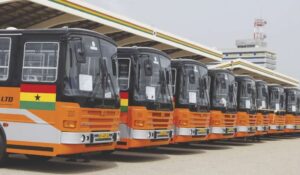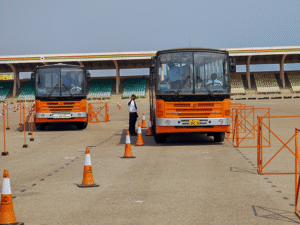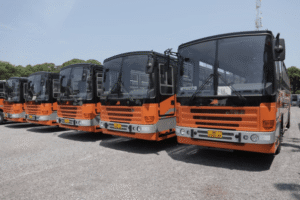The state-owned Metro Mass Transit (MMT) has reported a remarkable increase in its monthly revenue, rising to between GH¢13 million and GH¢14 million, up from the previous average of GH¢8.7 million. This surge comes despite the company operating with a significantly reduced fleet, the Managing Director Ceasar Kale has revealed.
Kale attributed this robust performance to a number of operational reforms, including the rollout of digital ticketing systems, enhanced route optimisation, and stricter monitoring systems to curb revenue leakages. He noted that while the company once routed around 160 buses daily under his predecessors, the current figure stands at 115 to 129 buses, yet revenue has grown substantially nonetheless.
“In spite of fewer buses on the road, we are generating more revenue because pilfering has gone down and our parcel division has been automated across the country,” Kale told Class FM during an interview. He indicated that the parcel business, previously operating at only 40 % automation coverage, now boasts 98 % coverage nationwide.

Analysts say the revenue jump reflects the untapped potential of Ghana’s public transport sector and the positive impact of improved governance and digitisation. For a company long plagued by mechanical breakdowns, ageing assets, and operational inefficiencies, the turnaround represents one of the most significant in recent years.
Yet, the success story is tempered by underlying structural challenges. MMT is still operating with a seriously reduced fleet compared to its peak. A decade ago the company ran over 1,000 buses across hundreds of routes; today it reportedly services only 115 buses on about 88 routes, making the revenue results even more striking in context.
The company’s debt burden remains high, however. As of August 2025, Kale noted that MMT’s debt stood at around GH¢123 million, marginally down from earlier levels but still a heavy load for a public enterprise seeking full recovery.
Key reforms cited by management include:
- Implementation of a digital ticket-ing platform, reducing cash handling and enabling accurate tracking of passenger and parcel revenue.
- Rationalisation of routes and schedules to match commuter demand more precisely, allowing fewer buses to generate more income.
- Institutional reform-driven cost control and anti-fraud measures, particularly targeting driver and conductor leakages.
- Expansion of the parcel logistics business, which has grown significantly and serves as a diversification of revenue beyond fare collections.
For government policy-makers, the performance of MMT aligns with the 24-Hour Economy Agenda, which aims to enhance urban mobility and efficient public transport systems in Ghana. In a recent visit to MMT, Deputy Transport Minister Dorcas Affo‑Toffey identified the company as a critical component of the national transport architecture. She said improving MMT’s fleet strength and reliability would facilitate round-the-clock operations and support economic activity.

Despite the revenue increase, industry observers caution that sustaining the gains will require sustained investment. A key concern remains the ageing bus fleet and maintenance backlog which could undermine service reliability if left unaddressed. Analysts suggest that without a substantial addition of new buses and modern infrastructure, the upturn in revenue may be short-lived.
Kale reaffirmed that MMT is positioning itself for expansion. He revealed plans to acquire approximately 2,000 new buses under a government-backed financing model that would not require upfront down-payments, with repayment terms spanning three to ten years. The expansion would also include introduction of new service divisions such as express inter-city routes, a hiring service, and upgraded cargo operations.
The improvement in revenue is also expected to have broader economic impacts. With increased income, MMT may be better able to stabilise fares, improve service frequency, and expand reach into underserved corridors, factors which may boost economic participation, reduce commuting costs and enhance accessibility for low-income commuters.
Moreover, the performance milestone provides a model for how public-sector transport enterprises can harness digitisation and operational discipline to improve viability. Experts say the key lesson is that optimising existing assets and systems can yield large gains even before big capital inflows.
The Transport Ministry has indicated its full support for MMT’s transformation. Officials have emphasised that additional funding, technical assistance, and regulatory support will be aligned to ensure that the gains are embedded and scaled. According to insiders, there is recognition that MMT must graduate from a recapitalised entity to a sustainably managed commercial operator.

For commuters across Ghana, especially in Accra, Kumasi and other high-density cities, the rise in MMT’s revenue is welcome. Reliable public transport is seen as a key enabler of the 24-Hour Economy policy and efforts to decongest cities, reduce transport costs and support urban-rural connectivity.
As MMT charts this upward trajectory, Management emphasises that the revenue figure itself is just a milestone. The larger goal remains: full fleet modernisation, service expansion, reliability, and ensuring that the company can operate profitably without recurrent bailouts. Kale said, “We are not just chasing money; we are rebuilding trust,” adding that “a reliable public bus service means more than profits; it means opportunity for the everyday Ghanaian.”
If the momentum continues, MMT may be on the path to becoming a revitalised asset in Ghana’s public transport ecosystem, and the GH¢14 million monthly revenue figure could soon become the baseline for a broader efficiency dividend in the sector.
Ghana Air Traffic Engineers Suspend Nationwide Strike Following Talks with GCAA

